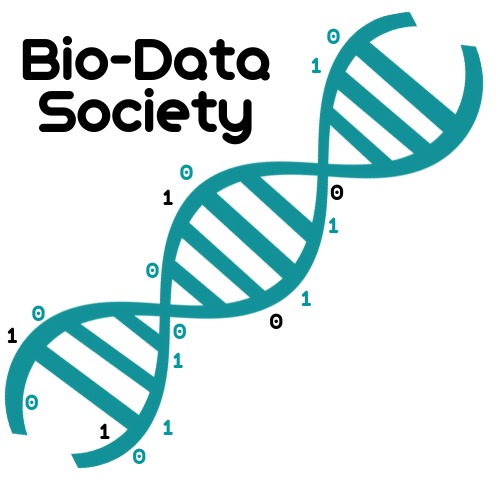Welcome to the BioData Society Website!

A Website for the BioData Society at Anglia Ruskin University
Newsletter 3 - The future sometime
This hasn’t happened yet
University-wide Academic Calendar.
This Term
For the Bioinformaticians (To be shared with Line managers and Mentors).
1 - Core Biology 2:
The ‘Core Biology 1’ and ‘Core Biology 2’ modules cover the fundamental principles that underpin the study of biology. The content is wide-ranging and addresses broader biological concepts such as zoology, botany, ecology and biodiversity. Development of multicellular organisms, and the influence of development on evolution are discussed, as well as scaling laws and their influence on structure and function of organs and organisms. The fundamental laws of physics that underpin the function of biological systems are also discussed. The module then shifts focus to the history of medicine and an introduction to the biology of disease. Tools to help us diagnose and treat disease, including an introduction to the biomedical science disciplines, aspects of pharmacology - in particular the importance of plant-derived chemicals - and technologies incorporating medical physics, are discussed. The causes of disease are varied, and we touch on a number of these, including diet, aging, neurological pathology, infectious organisms, vector-borne disease and toxicological considerations, in preparation for the pathology modules at Levels 5 and 6. Epidemiology of disease is discussed within these topics. Incorporated into the module is a visit to the Botanic gardens, with a tour of the history of plants in medicine. The module aims to help students develop key scientific skills, such as the ability to design experiments and carry them out competently, identify and solve problems and to present and describe data effectively. Emphasis is also given to the development of good basic numeracy, IT and communication skills and to the ability to work independently and as part of a team. Development of students’ personal development portfolios is embedded in the module.
Goals include:
Basic principles of botany, zoology, ecology and biodiversity
Developmental biology and evolutionary developmental biology
Biological scaling
Biophysics and medical physics
History of medicine and disease
Biology of disease
Diagnosis of disease
Pharmacology and drug discovery
Diet and disease, acid-base imbalance and toxicology
Aging, psychiatric, neurological, infectious and vector-borne disease
Epidemiology of disease
Assessed by:
Course work (50%) includes:
Lab report 80% weight
PDP 20% weight
Practical makes up the remaining 50%
Book list:
Essentials:
Brooker Biology
Concepts of Genetics - Third time this has come up and is apparently key for some Year 3 and 4 studies so maybe buy.
Recommended Time Allowance:
150 Hours for the Term
12.5 Hours per Week
Minimum Time Allowance:
36 Hours for the Term
3 Hours Per Week
This does not include time required for coursework.
2 - Bioinformatics Software, Tools and Programming
This module is designed to build on the foundation laid in ‘Computational Methods and Algorithms’ and ‘Introduction to Software Engineering’ to expand students’ ability to use existing bioinformatics tools and frameworks to design and implement pipelines to solve bioinformatics problems. Implementation topics will emphasize reproducibility and portability of pipelines using tools such as the Common Workflow Language (CWL) and Galaxy. These foundations are then utilised to develop novel bioinformatics algorithms. Further topics will be to interact with data resources to query for and to obtain data for analysis, by using REST-based (Web) Application Program Interfaces (APIs). The second part of this module looks at dealing with big data, data mining, and applying the latest machine learning approaches to bioinformatics problems previously implemented with standard pipelines. There is a substantial practical element in this module with many exercises in obtaining data and implementing reproducible pipelines as well as analytical elements in designing novel pipelines to solve given problems.
Goals include:
Creating tools in scripting languages to solve bioinformatics problems.
Bioinformatics software development (performance, complexity, portability, reproducibility).
Development of novel algorithms and bioinformatics pipelines from existing suites of tools.
Using cloud resources.
Machine Learning.
Introduction to Data Mining.
Web-based interfaces (APIs): design and use.
Demonstrate the ability to analyse a bioinformatics problem, and design an appropriate pipeline to produce desired results.
Demonstrate understanding of the modern concepts of machine learning and deep learning, and their application to data mining and traditional bioinformatics problems.
Use a scripting language or a bioinformatics framework to obtain data and to implement a complete analysis pipeline.
Develop and implement a machine learning-based bioinformatics analysis pipeline, demonstrating a basic understanding of novel machine learning tools and algorithms.
NOTE - It looks as though a requirement may be that you have a Linux VM
This may be something to ask your IT team about.
Assessed By:
Coursework - 60% weight 1 Hour Practical assessment - 40% weight
Book list:
Not Released
Recommended Time Allowance:
150 Hours for the Term
12.5 Hours per Week
Minimum Time Allowance:
36 Hours for the Term
3 Hours Per Week
As we know however there is already more than 3 hours of preparation for the week as it is.
This also does not include time required for coursework.